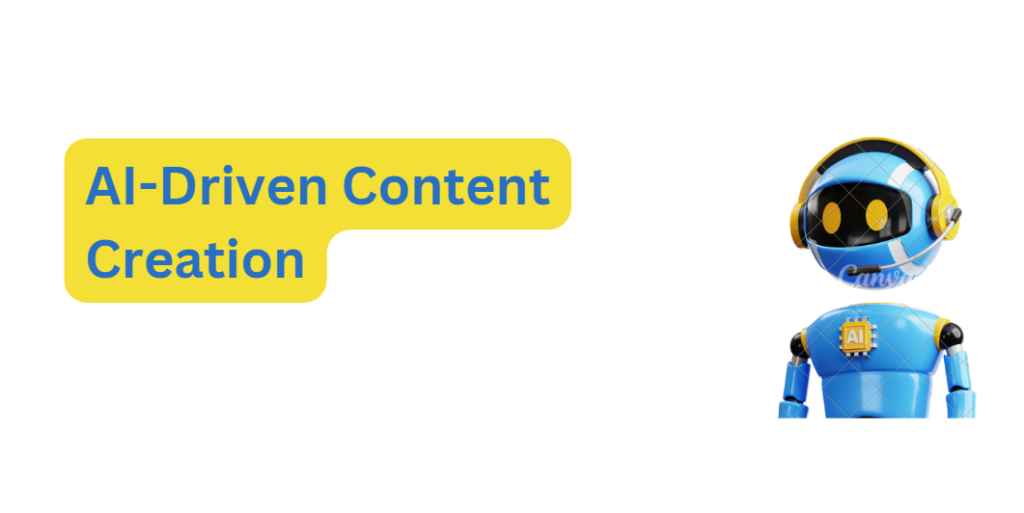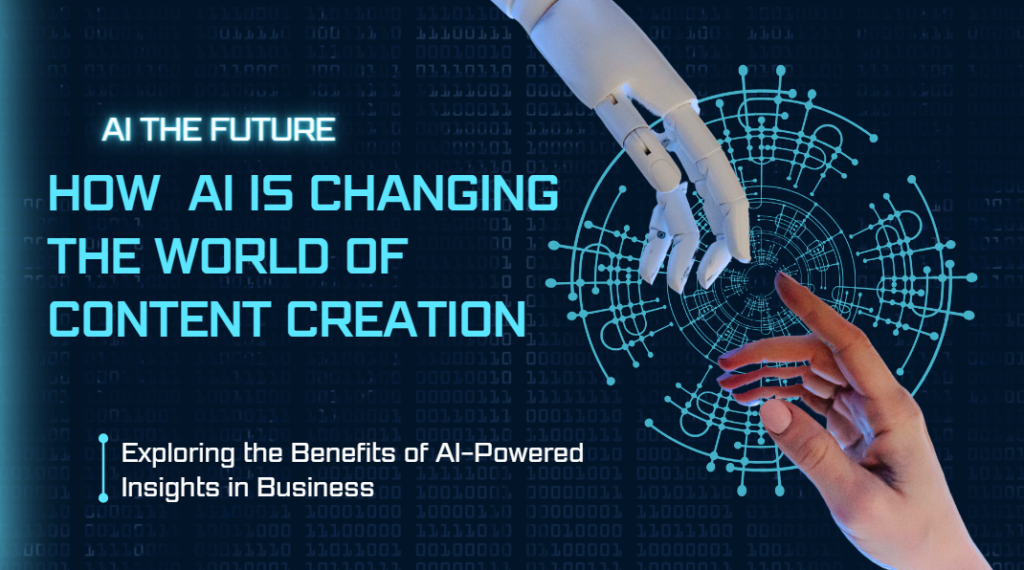AI-Driven Content Creation

A Revolution in How We Craft Information
The digital age has ushered in an era of unprecedented content consumption. From social media feeds overflowing with posts to websites brimming with articles, our hunger for information is insatiable. But keeping pace with this demand can be a challenge for content creators, especially those working with limited resources. This is where AI-driven content creation steps in, offering a powerful new way to generate, curate, and optimize content across various formats.
What is AI-Driven Content Creation?
In essence, AI-driven content creation leverages the power of artificial intelligence (AI) to streamline and enhance the content creation process. It utilizes a combination of technologies, including:
- Machine Learning (ML): ML algorithms learn and improve from experience, allowing AI tools to analyze vast datasets of text, images, and user behavior to identify patterns and inform content strategy.
- Natural Language Processing (NLP): NLP allows AI to understand the nuances of human language, including grammar, syntax, and semantics. This enables AI-powered tools to generate human-quality text, translate languages, and analyze sentiment.
- Large Language Models (LLMs): LLMs are powerful AI models trained on massive amounts of text data. They can generate different creative text formats, like poems, code, scripts, musical pieces, email, letters, etc., and answer your questions in an informative way.
- Computer Vision: This technology enables AI to interpret visual data, allowing tools to generate or edit images and videos based on specific requirements.

How Does AI-Driven Content Creation Work?
Imagine you’re a content creator for a travel website. Traditionally, you might brainstorm topic ideas, conduct research, and manually write articles. With AI-driven content creation, the process becomes more efficient:
- Ideation and Research: You can leverage AI tools that analyze website traffic, social media trends, and search engine queries to suggest trending topics relevant to your target audience. These tools can also gather information from various sources to support your content creation.
- Content Generation: Once you have a topic, AI writing assistants can help you craft compelling headlines, outlines, and even entire drafts of your article. These tools analyze your chosen topic and writing style to generate content that is factually accurate, grammatically correct, and engaging.
- Content Optimization: AI can analyze your content for SEO best practices, suggesting relevant keywords and optimizing it for search engine visibility. Additionally, AI tools can personalize content for different user segments, ensuring it resonates with specific audience demographics and interests.
Beyond Text: AI’s Impact on Multimedia Content Creation
The influence of AI extends beyond text creation. Here are some ways AI is transforming multimedia content:
- Image and Video Generation: AI algorithms can generate realistic images and videos based on text prompts or descriptions. This can be immensely helpful for creating social media graphics, product mockups, or even explainer videos.
- Music Composition: AI can generate royalty-free music tailored to specific moods, genres, or themes. This eliminates the need for expensive music licensing and allows creators to personalize their video content.
- Automated Editing and Enhancement: AI tools can automatically edit videos, removing unwanted footage, adding transitions, and even color correcting visuals. This frees up content creators to focus on the creative aspects of video production.
Benefits of AI-Driven Content Creation
The integration of AI into content creation offers numerous advantages:
- Increased Efficiency: AI automates repetitive tasks, allowing creators to focus on strategic planning and creative brainstorming.
- Content Scalability: AI tools can help produce a high volume of content consistently, meeting the ever-growing demand for information.
- Improved Personalization: AI allows for content to be tailored to specific audience segments, increasing engagement and conversion rates.
- Data-Driven Insights: AI-powered analytics provide valuable data on content performance, enabling creators to optimize their strategies for better results.
- Cost-Effectiveness: AI tools can streamline workflows, potentially reducing content creation costs and resource allocation.
Examples of AI-Driven Content Creation Tools
Several AI-powered content creation tools are available, catering to different needs and budgets. Here are a few popular examples:
- Jasper (formerly Jarvis): This tool helps generate content formats like blog posts, social media captions, product descriptions, and marketing copy.
- Copy.ai: This platform offers a wide range of content creation features, including writing assistants, headline generators, and landing page copywriters.
- Articoolo: This AI tool focuses on generating long-form content, such as articles, e-commerce product descriptions, and blog posts.
- Pictory: This platform utilizes AI to create professional-looking marketing videos from text descriptions and images.
- Unsplash offers a vast library of free, high-resolution images and videos.
The Future of AI-Driven Content Creation:
A Look Ahead
While AI-driven content creation offers a plethora of benefits, it’s important to acknowledge both its current limitations and its exciting potential for the future.
Challenges and Considerations
- Originality and Creativity: While AI can generate human-quality text, true creative breakthroughs often require a spark of human ingenuity. AI can be a powerful tool to assist human creativity, but it likely won’t replace it entirely.
- Bias and Factual Accuracy: AI algorithms are only as good as the data they are trained on. If the training data is biased, the generated content can reflect that bias. It’s crucial to ensure AI tools are trained on high-quality, diverse datasets to minimize factual errors and bias.
- Transparency and Ethics: As AI-generated content becomes more prevalent, transparency is key. Audiences should be aware of when they’re consuming AI-crafted content. Additionally, ethical considerations regarding job displacement and the potential for misuse of AI-generated content for malicious purposes need to be addressed.
The Evolving Landscape: What to Expect
The field of AI-driven content creation is rapidly evolving. Here are some potential future developments:
- More Sophisticated AI Models: Advancements in AI could lead to the development of even more sophisticated models capable of generating even more creative and nuanced content formats.
- AI-powered Content Curation: AI could play a more significant role in curating content, personalizing experiences for individual users by suggesting relevant articles, videos, or social media posts based on their past behavior and interests.
- Integration with Marketing Automation: AI-generated content could be seamlessly integrated with marketing automation platforms, allowing businesses to personalize content across various touchpoints in the customer journey.
- Multilingual Content Creation: AI could break down language barriers by generating and translating content in real-time, catering to a global audience with ease.
The Human-AI Collaboration
The future of content creation likely lies in a collaborative approach, where AI empowers human creators to achieve greater efficiency and effectiveness. Here’s what this collaboration might look like:
- AI as an Assistant: AI tools can assist human creators by handling repetitive tasks, providing research support, and suggesting creative ideas. This frees up human creators to focus on higher-level thinking and strategic content development.
- Human Oversight and Refinement: While AI can generate drafts and content outlines, human expertise remains crucial for editing, fact-checking, and ensuring the content aligns with brand voice and overall strategy.
- Focus on Storytelling: With AI handling the mechanics, human creators can dedicate their time to crafting compelling narratives and building emotional connections with their audience.
In conclusion, AI-driven content creation is revolutionizing the way we develop and deliver information. As the technology continues to evolve and overcome its limitations, the future promises a powerful partnership between human creativity and artificial intelligence, leading to a new era of rich, personalized, and impactful content experiences.
